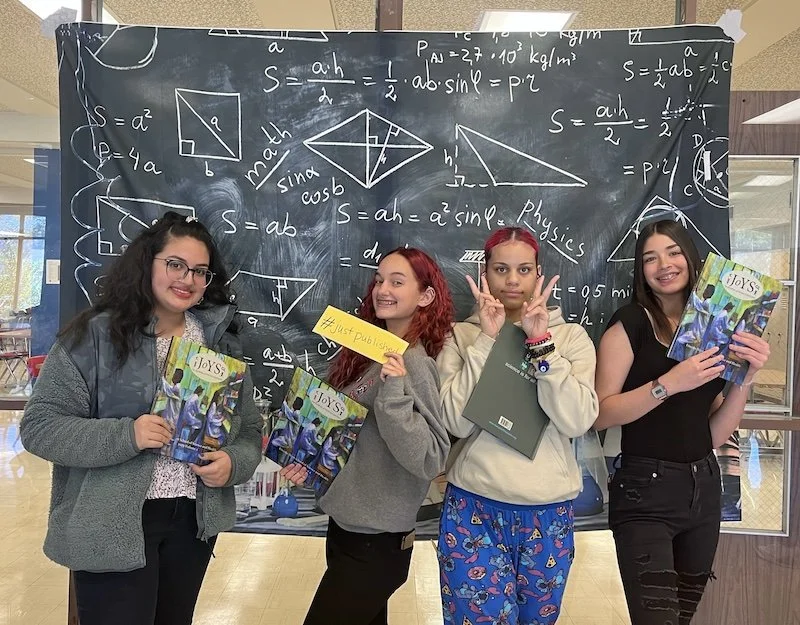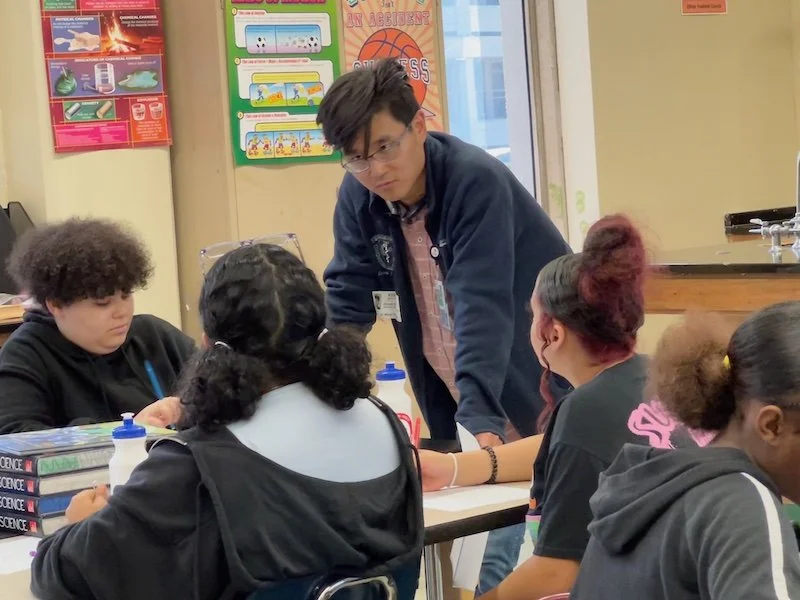Becoming Scientists
Young researchers from Lincoln West School of Science and Health in Cleveland receive copies of JOYS The Journal of Young Scientists, shortly after publication. The journal is a compilation of the self-driven research projects they worked on last spring through a program called Life as a Scientist.
“This is the future of science education. It’s a transformative program that completely changes the way science is learned. And none of this would be possible without the support of the Jennings Foundation.”
- Marissa Scavuzzo, PhD, Rise Up: Northeast Ohio Co-Founder, Scientific Director
Are artificial sweeteners bad for you, how do chemicals in Clorox affect daily life, meat diets vs. vegetarian diets…Tenth-grade students at Lincoln West School of Science and Health in Cleveland researched these topics and others last year through a program called Life as a Scientist. The initiative was designed by Rise Up: Northeast Ohio, a science education outreach group that aims to correct inequities in science education. Its goals are to expose students to scientists and science careers, empower students with information, equip classrooms with learning tools, and provide students hands-on experiences and unprecedented opportunities.
Rise Up builds capacity for rigorous, high-quality science experiences for students in lower-income urban districts, explains Dr. Marissa Scavuzzo, a research scientist who co-founded Rise Up: Northeast Ohio in 2019 with her husband, Andrew Scavuzzo, and Dr. Paul Tesar, a professor at Case Western Reserve University’s School of Medicine.
“You’ve heard of the glass ceiling?” Dr. Scavuzzo asks. “In science, there is a ‘glass floor.’ Unless you come from a wealthier background, studies show it’s extremely hard to break into a science career. That leads to the homogenization of scientists, and the field is losing out on a whole group of diverse people.”
Rise Up helps students from urban public schools get the materials and the experiences they need to gain the upper hand in scientific research. “We believe science is for all of us,” she says, “so we offer these students not only what their private school peers have, but something that is unique and different.”
Dr. Marissa Scavuzzo shows the current class of students at Lincoln West samples of the journal created by their peers last spring to document the experiments they worked on through the Life as a Scientist program.
Working with Professionals
Rise Up’s Life as a Scientist program pairs practicing professional scientists with students and leads them in immersive, cutting edge scientific research. Over the course of a year, students model what it’s like to be science practitioners. They brainstorm ideas, develop and submit research proposals, work in teams to carry out research projects, present the results, and publish their findings in a hardbound journal. Last year, 40 tenth graders from Lincoln West took part. A grant from the Jennings Foundation allows Rise Up to fund materials and supplies needed to conduct the tailored experiments.
The program begins early in the school year when Dr. Scavuzzo and a team of Rise Up volunteers visit science classes at Lincoln West to explain the process of scientific research and to ask students to daydream about topics that interest them. The Rise Up team returns once a month throughout the fall to guide the teens as they turn their ideas into solid research grant proposals. While all students create and submit a proposal, only a handful will get funded.
“We work behind the scenes to review the students’ grant proposals and decide which ones to fund,” says Dr. Scavuzzo, explaining that Rise Up’s selection process is modeled on the National Institute of Health’s protocol. “We read all the grant requests, discuss them, and score them. The ones with the highest scores get funded. We consider whether it’s a good idea, if the student has a good reason to study a specific topic, and what is feasible in a high school classroom.” Ultimately, Rise Up funds at least three projects per class. The students then join teams and work together on the funded projects for the remainder of the year.
Students test different kinds of pork products on male fruit flies to study whether or not pork is harmful to humans.
Immersive Deep Learning
After winter break, the intensive lab work begins. Rise Up scientists visit weekly to teach students the skills and techniques needed to complete their experiments.
“We teach them pretty advanced skills that could get them jobs right out of high school,” explains Dr. Scavuzzo. “Some of these skills researchers don’t even do as undergraduates, and we are teaching them to ninth and tenth graders.”
Dr. Scavuzzo confirms that deep learning is evident throughout the project: “The students come up with their own ideas, develop agency, and are empowered to drive their own work. They gain confidence in their decision-making. We teach the technical skills, but they continue to ask questions and decide what they want to test.”
A page from JOYS The Journal of Young Scientists that documents what happened when students applied Vaseline to earthworms in their study of dry skin.
Andrew Scavuzzo, RiseUp’s Co-Founder and Executive Director, says teamwork is an essential component of the program: “We didn’t think about this at the beginning, because we are science- focused, but we soon realized that the students are gaining social and emotional learning skills that are really important as they go through high school and think about getting into the workforce or going on to college.”
“One of the things I like about science careers,” adds Dr. Scavuzzo, “is that none of us does anything in isolation. We are a diverse group of people who work in teams, ask each other questions, and bounce ideas off one another. And the students are doing the very same thing.”
Rise Up volunteers discuss possible research topics with ninth and tenth graders at Lincoln West in fall 2023.
Rise Up relies on an impressive group of volunteers to guide students as they complete their research — practicing scientists from prestigious facilities such as Case Western Reserve University, The Cleveland Clinic, and Cleveland State University. “They are all so different,” says Dr. Scavuzzo, “not only in the type of science they do, but in their backgrounds, what they look like, how they act. With such a diverse group, students can relate to someone. So they get exposure to people who do different things, think differently, and are excited to share their experiences.
“The volunteers also get so much from the program,” she adds. “They love seeing the excitement in the kids and go back to their own labs reinvigorated to do their own research.”
Once the experiments are completed, the students present their findings at a science symposium. They also submit manuscripts to the Rise Up team for review, just as professionals must do. The students revise their manuscripts based on the practitioners’ edits and comments, and finally, their work is published in a journal titled Joys The Journal of Young Scientists.
Kemuel Cruz, an 11th grade student at Lincoln West, describes what he enjoyed most about participating in the Life as a Scientist program last year. Kemuel also spent ten days rotating through different labs at Case Western Reserve University during the summer to learn more about research science and working as a professional.
As they launch their second year of the Life as a Scientist program, Dr. Scavuzzo says she has been surprised at its impact. “We have gotten many more students interested in science than I ever would have expected,” she remarks. “Students who might not have asked questions in class before are now driving their own projects and asking their own questions.”
“I am not a scientist,” says Mr. Scavuzzo, “So I am always learning something new. But what has stood out is that you cannot underestimate these students. There are some you don’t think you’re connecting with, and suddenly, they blossom. It’s fun to see them take ownership of their projects and grow their ideas.”
“I think this program teaches the students, and us, just how important it is to ask questions,” adds Dr. Scavuzzo. “There are just so many important questions to ask, and they are all fascinating.”







